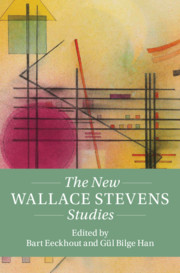Book contents
- The New Wallace Stevens Studies
- Twenty-First-Century Critical Revisions
- The New Wallace Stevens Studies
- Copyright page
- Contents
- Contributors
- Abbreviations
- Introduction That Which Is Always Beginning
- Part I Emerging Concepts in Stevens Criticism
- Part II Recent Critical Methods Applied to Stevens
- Chapter 6 World Literature
- Chapter 7 Ecological Poetics
- Chapter 8 Urban Studies
- Chapter 9 Queer Studies
- Chapter 10 Intersectional Studies
- Chapter 11 Cognitive Literary Studies
- Part III Revisionary Readings of Stevens
- Index
- References
Chapter 7 - Ecological Poetics
from Part II - Recent Critical Methods Applied to Stevens
Published online by Cambridge University Press: 18 June 2021
- The New Wallace Stevens Studies
- Twenty-First-Century Critical Revisions
- The New Wallace Stevens Studies
- Copyright page
- Contents
- Contributors
- Abbreviations
- Introduction That Which Is Always Beginning
- Part I Emerging Concepts in Stevens Criticism
- Part II Recent Critical Methods Applied to Stevens
- Chapter 6 World Literature
- Chapter 7 Ecological Poetics
- Chapter 8 Urban Studies
- Chapter 9 Queer Studies
- Chapter 10 Intersectional Studies
- Chapter 11 Cognitive Literary Studies
- Part III Revisionary Readings of Stevens
- Index
- References
Summary
When we think of Wallace Stevens and the question of ecological poetics, we probably are drawn to think of what he called his poetic “mundo”: a poetic universe structured by the turning of the seasons, which themselves correspond to distinct philosophical and phenomenological stances. The world of summer, for example, is a world of fecund imagination creating the world anew, while the world of winter is a world of “decreation” and contraction, a return to “things as they are.” We can get a radically different view of Stevens as an ecological poet, however, if we deploy a concept of environment that is more scientifically contemporary, one that foregrounds the dynamic co-implication and co-production of organism and environment in all its contingency, as highlighted in the contemporary biology of perception and cognition as we find it in figures such as Humberto Maturana and Francisco Varela. In this light, the ecological dimension of Stevens’s poetry may be located in the fact that his poetics enacts the same “operating program,” with all its attendant paradoxes, of autopoietic living systems, rather than engaging in a representational relationship to what we used to call “nature.”
Keywords
- Type
- Chapter
- Information
- The New Wallace Stevens Studies , pp. 100 - 110Publisher: Cambridge University PressPrint publication year: 2021

